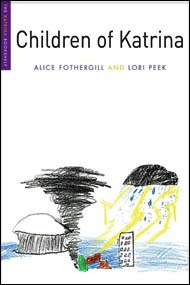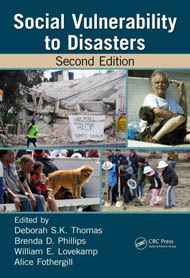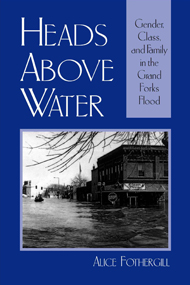Explore the research section of my website to learn more about my time in the field.

Children of Katrina examines the experiences of children and youth in Hurricane Katrina and how their lives unfolded in the catastrophe and displacement. Professors Fothergill and Peek spent seven years studying a group of children and youth, as well as their families, friends, neighbors, and teachers, among others. They observed and interviewed young people who ranged in age from 3- to 20-years of age at the time of the storm. In addition to the larger sample of over 500 children and youth whom they studied, they also followed a select group to explore more intensely how this catastrophic event unfolded in their lives. It was their goal to understand their experiences, to identify how others assisted in their recovery, and to document how they helped themselves and other children recover after Katrina.
While children are often depicted in monolithic ways—as little rubber balls that will just "bounce back" after disaster, or, conversely, as totally vulnerable victims who are helpless in the face of extreme adversity—their research revealed the complexity of their lived experiences in the aftermath of Katrina. Specifically, their work identifies three recovery patterns: (1) The Declining Trajectory: These children experienced simultaneous and ongoing disruptions in their families, schooling, housing, health and health care, friendships, and other key areas of their lives; (2) The Finding Equilibrium Trajectory: After an initial period of disruption and minor decline, these children were able to attain stability; and (3) The Fluctuating Trajectory: Children who followed this trajectory had a mixed pattern of post-Katrina stable moments followed by unstable periods in their lives. Fothergill and Peek also found that children had many capacities in the disaster and throughout displacement, including helping themselves, adults, and other children in numerous ways.

Social Vulnerability to Disasters focuses on the social construction of disasters, acknowledging that the characteristics of an event alone do not create the tragedies that unfurl. Research has shown that recognizing and focusing on at-risk populations can create better mitigation, response, preparedness, and recovery capabilities -- and can lessen the economic and social impact of disasters overall. As disasters continue to increase in frequency and intensity around the globe, now is the time to move forward to reduce vulnerability to such events. It is the only book available that provides a comprehensive examination of vulnerability in disasters based on empirical, scientific literature. Using a multi-disciplinary approach, Social Vulnerability to Disasters examines historical, geographic, social, and cultural factors and conditions that put people differentially at risk before, during, and after disasters .

Heads Above Water examines the experiences of women and their families who survived the Grand Forks, North Dakota, flood of 1997, one of the worst natural disasters in U.S. history at that time and the first time an entire U.S. city had evacuated for a disaster. This book explores the challenges women faced and analyzes the importance of class, race, gender, sexual orientation, and disability in their disaster recovery. The women found themselves face to face with social and familial upheaval, emotional and physical trauma, precarious economic and social status, and feelings of loss and violation. By exploring the experiences of these women, Professor Fothergill contributes to the broader sociological discussions about women's labor at home and in the workplace, the stigma of needing and receiving assistance, family relationships under stress, domestic violence, downward mobility, and the important of "home" to one's identity and sense of self. Heads Above Water offers poignant insight into women's everyday lives in an extraordinary time. Read reviews of Heads Above Water (PDF).
Fothergill, Alice. 2013. "Managing Childcare: The Experiences of Mothers and Childcare Workers," Sociological Inquiry. 83 (3): 421-447.
Peek, Lori and Alice Fothergill. 2009. "Using Focus Groups: Lessons from Studying Daycare Centers, 9/11, and Hurricane Katrina." Qualitative Research. 9(1): 31-59.
Steffen, Seana Lowe and Alice Fothergill. 2009. "9/11 Volunteerism: A Pathway to Personal Healing and Community Engagement." The Social Science Journal. 46:29-46.
Peek, Lori and Alice Fothergill. 2008. "Displacement, Gender, and the Challenges of Parenting after Hurricane Katrina (PDF)." National Women's Studies Association Journal. 20(3): 69-104.
Manuel Pastor, Robert D. Bullard, James K. Boyce, Alice Fothergill, Rachel Morello-Frosch, and Beverly Wright. 2006. "Environment, Disaster, and Race After Katrina." Race, Poverty, and the Environment. 13(1): 21-25. (this article is based on the Russell Sage Monograph).
Fothergill, Alice, Mary Val Palumbo, Betty Rambur, Kyndaron Reinier, and Barbara McIntosh. 2005. "The Volunteer Potential of Inactive Nurses for Disaster Preparedness." Public Health Nursing. 22(5): 414-421.
Fothergill, Alice and Lori Peek. 2004. "Poverty and Disasters in the United States: A Review of Recent Sociological Findings." Natural Hazards. 32: 89-110.
Fothergill, Alice. 2003. "The Stigma of Charity: Gender, Class, and Disaster Assistance." The Sociological Quarterly. 44(4):659-680.
Fothergill, Alice and Kathryn Feltey. 2003. "'I've Worked Very Hard and Slept Very Little': Mothers on the Tenure Track in Academia." Journal for the Association for Research on Mothering. 5(2):7-19.
This article was reprinted in a commemorative volume of the best articles from the journal:
Fothergill, Alice and Kathryn Feltey. 2004. "'I've Worked Very Hard and Slept Very Little': Mothers on the Tenure Track in Academia" pp. 218-230 in Motherhood Matters: Motherhood as Discourse and Practice, edited by Andrea O'Reilly. Toronto: Association for Research on Mothering.
Fothergill, Alice. 2000. "Knowledge Transfer Between Researchers and Practitioners." Natural Hazards Review 1(2): 91-98.
Fothergill, Alice. 1999. "Women's Roles in a Disaster." Applied Behavioral Science Review 7(2):125-143.
Fothergill, Alice, Enrique Maestas, and JoAnne Darlington. 1999. "Race, Ethnicity, and Disasters in the United States: A Review of the Literature." Disasters 23(2):156-173.
Fothergill, Alice. 1999. "An Exploratory Study of Woman Battering in the Grand Forks Flood Disaster: Implications for Community Responses and Policies." International Journal of Mass Emergencies and Disasters 17(1):79-98.
Fothergill, Alice. 1996. "Gender, Risk, and Disaster." International Journal of Mass Emergencies and Disasters 14(1):33-56.
2013. Reprinted as a chapter in Migration and Climate Change. Edited by Hugo, Graeme. University of Oxford, International Migration Institute: Edward Elgar Publishing.
T. Fitzgerald, A. Fothergill, K. Gilmore, K. Irwin, C. Kunkel, S. Leahy, J. Nielsen, E. Passerini, M. Virnoche, and G. Walden. 1995. "What's Wrong is Right: A Response to the State of the Discipline." Sociological Forum 10(3):493-498.
Manuel Pastor, Robert D. Bullard, James K. Boyce, Alice Fothergill, Rachel Morello-Frosch, and Beverly Wright. 2006. In the Wake of the Storm: Environment, Disaster, and Race After Katrina. New York: Russell Sage Foundation.
Fothergill, Alice and Lori Peek. 2012. "Permanent Temporariness: Displaced Children in Louisiana" pp. 119-143 in Displaced: Life in the Katrina Diaspora, edited by L. Weber and L. Peek. Austin: University of Texas Press.
Peek, Lori and Alice Fothergill. 2009. "Parenting in the Wake of Disaster: Mothers and Fathers Respond to Hurricane Katrina." In Women, Gender, and Disaster: Global Issues and Initiatives, edited by Elaine Enarson and P.G. Dhar Chakrabarti. Los Angeles: Sage Publishers.
Fothergill, Alice and Lori Peek. 2006. "Surviving Catastrophe: A Study of Children in Hurricane Katrina" pages 97-129 in Learning from Catastrophe: Quick Response Research in the Wake of Hurricane Katrina. Boulder, CO: Natural Hazards Research and Applications Information Center, University of Colorado.
Enarson, Elaine, Alice Fothergill, and Lori Peek. 2006. "Gender and Disaster: Foundations and Directions." Handbook of Disaster Research, edited by H. Rodriguez, E. L. Quarantelli, and R. Dynes, pp. 130-146. New York: Springer.
Lowe, Seana and Alice Fothergill. 2003. "A Need to Help: Emergent Volunteer Behavior after September 11th" pages 293-314 in Beyond September 11th: An Account of Post-Disaster Research. Boulder, CO: Natural Hazards Research and Applications Information Center, University of Colorado.
Fothergill, Alice. 1998. "The Neglect of Gender in Disaster Work: An Overview of the Literature" pp.11-25 in The Gendered Terrain of Disaster: Through Women's Eyes (1998) edited by Betty Hearn Morrow and Elaine Enarson. Westport, CT: Praeger Publishers/Greenwood Publishing Group (revised article).
Peek, Lori and Alice Fothergill. 2014. "Post-Disaster Decline: Understanding Children's Vulnerability Before, During, and After Katrina" in The Dialogue, Journal on Disaster Behavioral Health, SAMHSA, Department of Health and Human Services. 10 (3): 2-4.
Fothergill, Alice and Lori Peek. 2014. "Lessons from Katrina: Recommendations for Fostering More Effective Disaster Preparedness, Response, and Recovery Efforts for Children and Youth" in the Canadian Risk and Hazards Journal HazNet, 10th edition, pages 4-8, www.crhnet.ca
Lori Peek and Alice Fothergill. 2006. "Reconstructing Childhood: An Exploratory Study of Children in Hurricane Katrina. Quick Response Report #186. Boulder, CO: Natural Hazards Research and Applications Information Center, University of Colorado. URL: http://www.colorado.edu/hazards/qr/qr186/qr186.pdf. (Final Report — National Science Foundation Quick Response Research Grant)
Fothergill, Alice. 2003. Professionalization and Participation in Child and Youth Care: Challenging Understandings in Theory and Practice, by Erik Knorth, Peter Van den Bergh, and Fop Verheij in Contemporary Sociology: A Journal of Reviews. 32 (5): 574-575.
Gimenez, Martha E., Glenn W. Muschert, and Alice Fothergill. 1997. "Considerations on Wealth, Class, and Race." Critical Sociology 23(2):105-116.
Gimenez, Martha E., Glenn W. Muschert, and Alice Fothergill. 1997. "Black Wealth/White Wealth: A New Perspective on Racial Inequality." Science and Society Winter 1997-1998, 61(4):572-575.
Dean's Discretionary Funds. 2010. Grant to attend the International Sociological Association's World Congress in Sweden. University of Vermont's College of Arts and Sciences. ($500).
Dean's Faculty Research Grant. 2007. "Children and Disaster Recovery: A Follow-Up Study". Funded by the University of Vermont's College of Arts and Sciences Dean's Fund. ($900)
Co-Principal Investigator, "Reconstructing Childhood: An Exploratory Study of Children in Hurricane Katrina." 2005. Funded by the Natural Hazards Center and the National Science Foundation (NSF) Quick Response Research Grant Program. Lori Peek, Co-Principal Investigator. ($3,500)
Dean's Faculty Research Grant. 2005. "Children's Experiences in Hurricane Katrina." Funded by the University of Vermont's College of Arts & Sciences Dean's Discretionary Fund. ($350)
Dean's Faculty Research Grant. 2005. "Dark Tourism and Long-term Disaster Recovery." Funded by the University of Vermont's College of Arts & Sciences Dean's Fund. ($2,000)
Dean's Faculty Research Grant. 2004. "9/11 Volunteerism." Funded by the University of Vermont's College of Arts & Sciences Dean's Fund. ($1750)
Dean's Faculty Research Grant. 2004. "Heads Above Water: Gender, Class, and Family in the Grand Forks Flood." Funded by the University of Vermont's College of Arts & Sciences Dean's Fund ($250)
The Beverly Sears Graduate Research Grant. 1998. Funded by the Graduate School, University of Colorado.